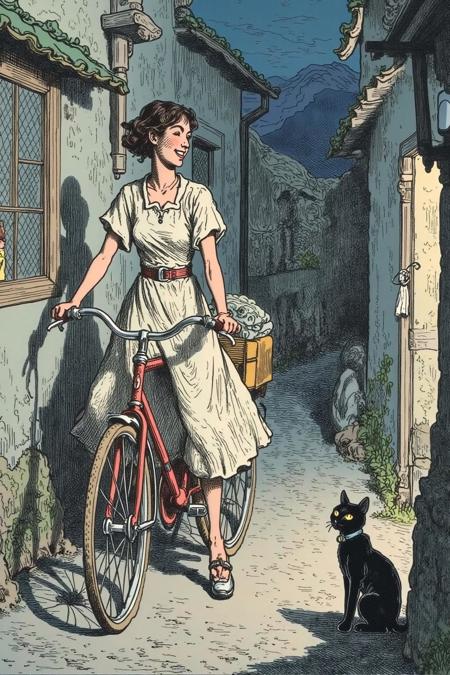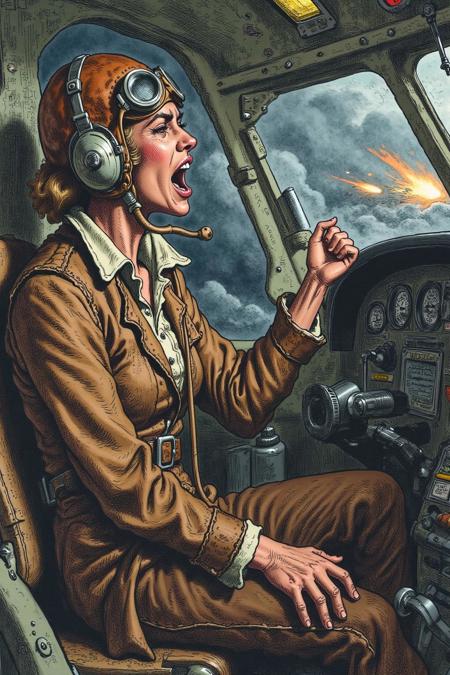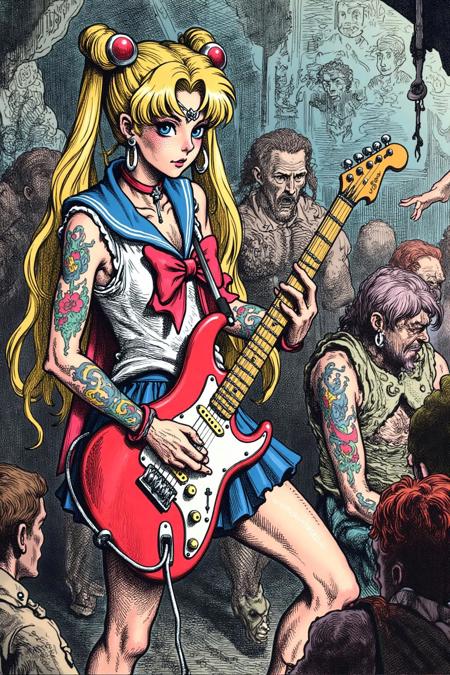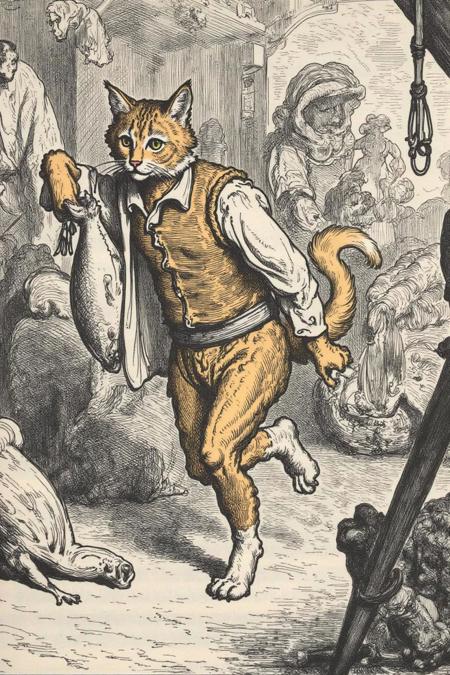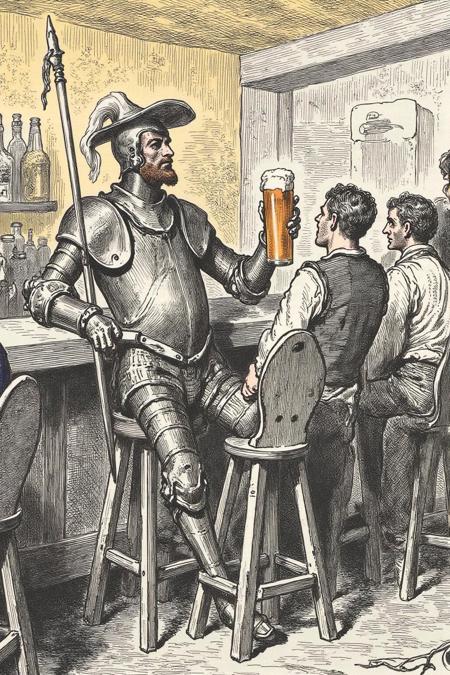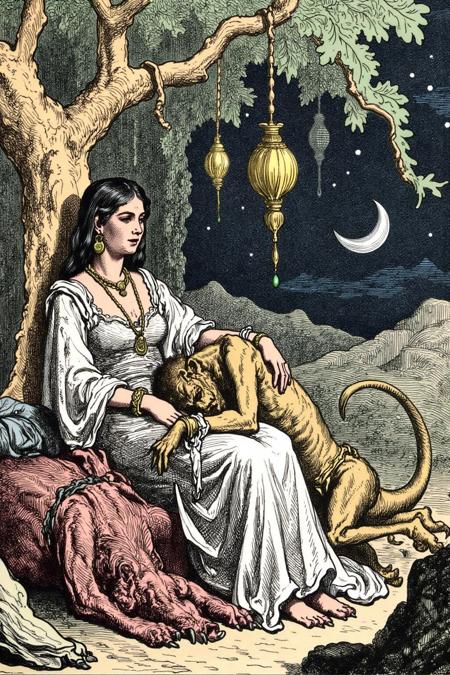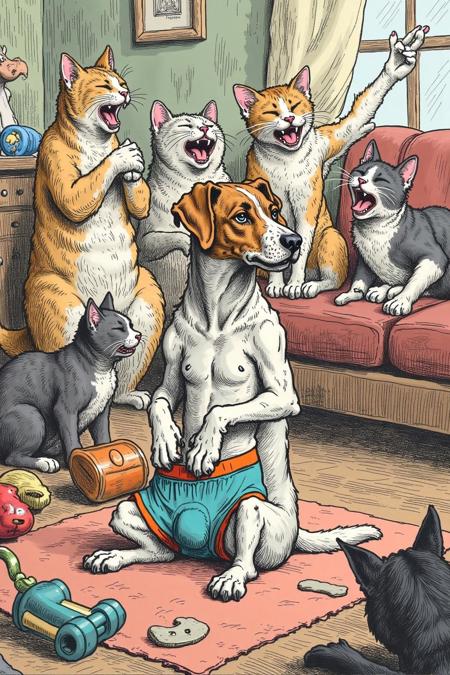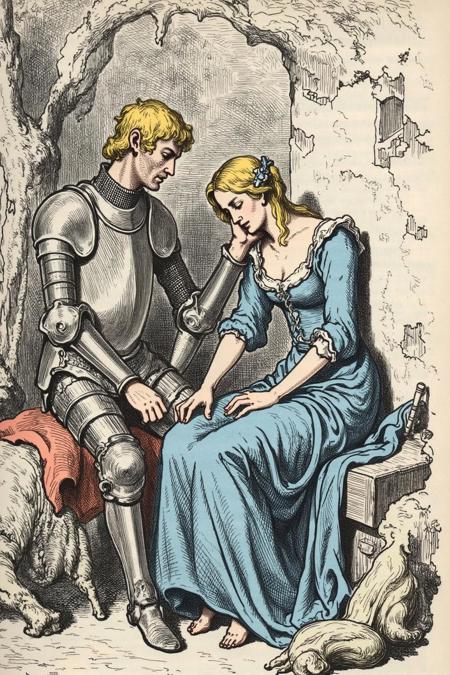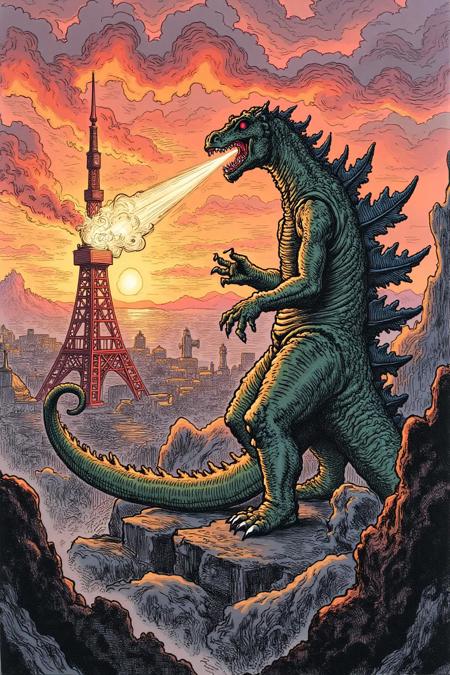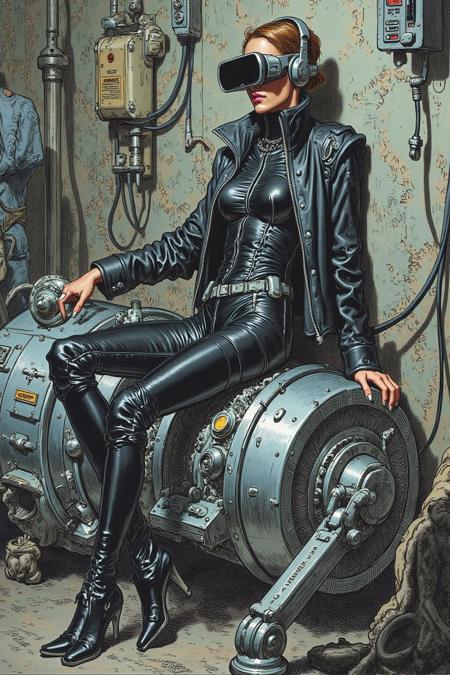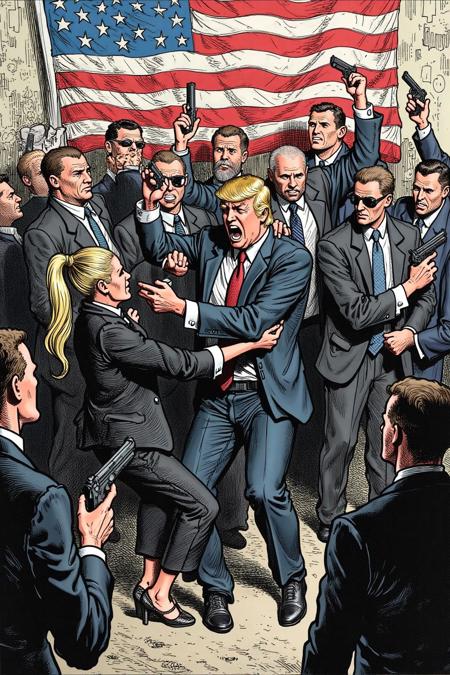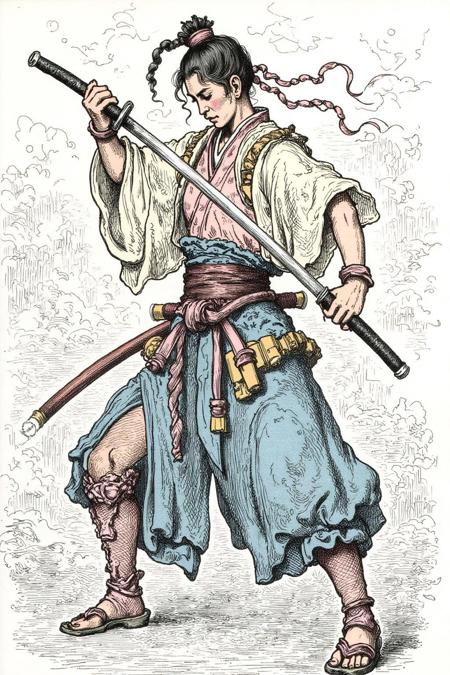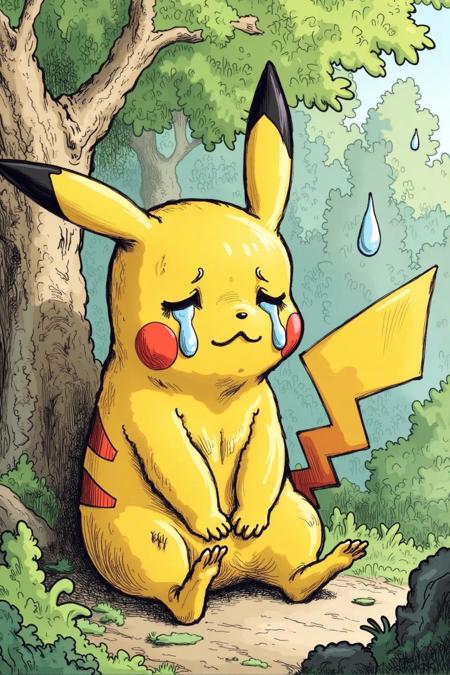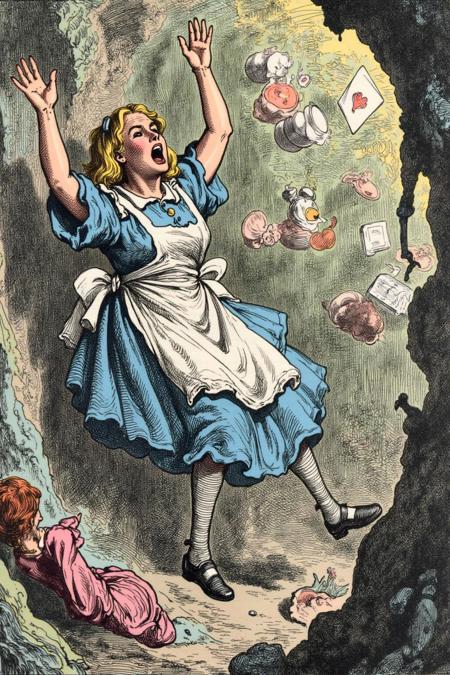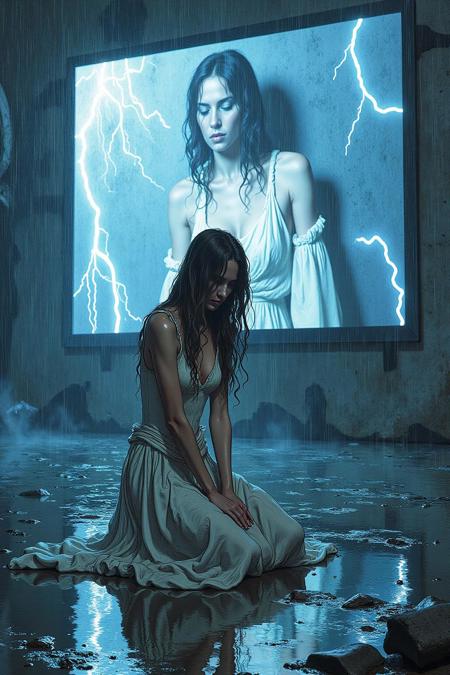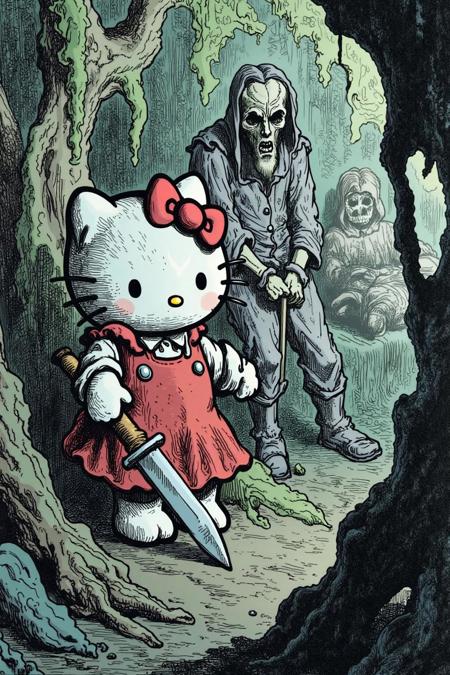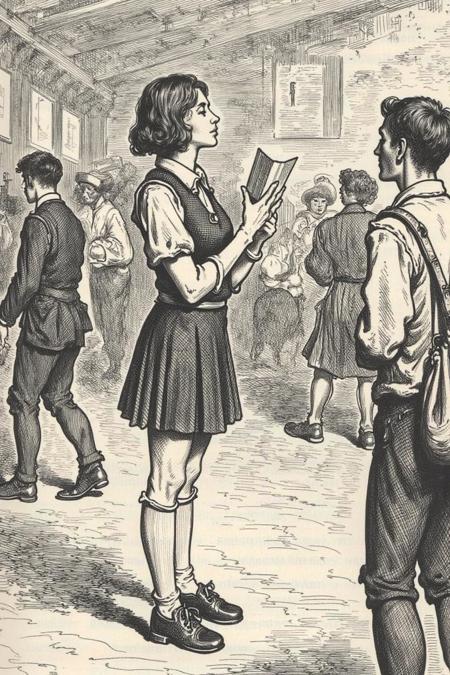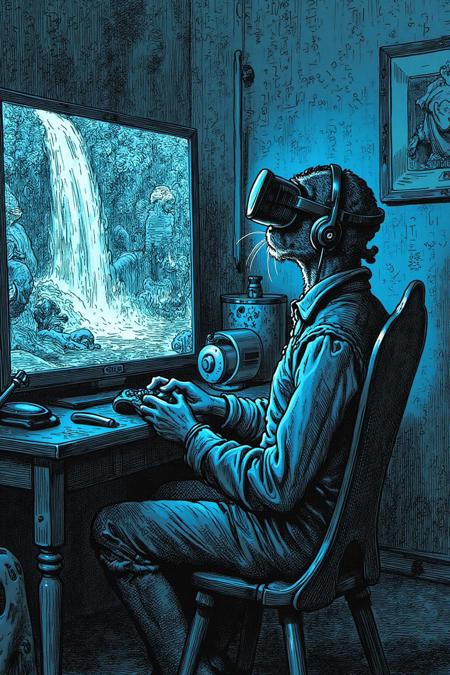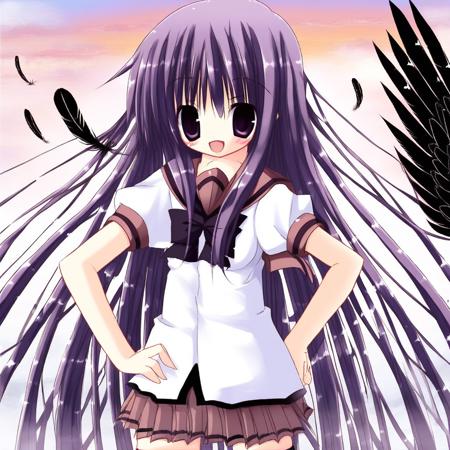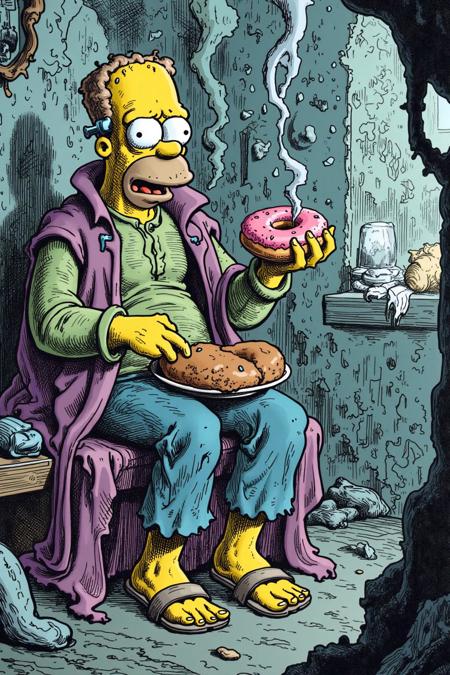
Trained with Gustave Doré's best work, his canonical illustrations for Cervantes' "Don Quixote": https://commons.wikimedia.org/wiki/Category:Illustrations_by_Gustave_Doré_in_L'ingénieux_hidalgo_don_Quichotte_de_la_Manche_(1863)
I only used his more free flowing smaller illustrations and not the big full page engraving because I like that simpler style.
The LoRA has strong effect even without the trigger "gusdore1", but without "illustration" Flux will default to photo style images for most prompts.
Training parameters
Captioning: Florence 2 or "no captions"
Repeat: 20 Epoch: 10-12 Trained with 15 512x512 images , 3000-3600 steps
Unet LR: 0.0005 Scheduler: cosine Optimizer: AdamW
Network Dim: 4 Alpha: 2
From ChatGPT:
Gustave Doré (1832–1883) was a prolific French artist, engraver, illustrator, and sculptor, renowned for his dramatic and imaginative illustrations of literary classics and religious themes. His detailed and expressive work elevated the art of illustration to new heights, making him one of the most celebrated artists of the 19th century.
Early Life and Career
-
Birthplace: Doré was born on January 6, 1832, in Strasbourg, France.
-
Artistic Beginnings: A child prodigy, Doré displayed extraordinary talent in drawing from a young age. By the time he was 15, he was hired as a caricaturist for the French journal Le Journal pour rire.
-
Versatility: Though initially recognized for his caricatures, Doré soon transitioned into book illustration, which became his defining career.
Artistic Style
Doré’s art is characterized by:
-
Intricate Detail: His engravings and illustrations are richly detailed, with intricate linework that brings scenes vividly to life.
-
Dramatic Composition: Doré’s work often features dramatic contrasts of light and shadow, emphasizing mood and emotion.
-
Imaginative Vision: He was known for his ability to visualize complex, fantastical, or otherworldly scenes with a sense of grandeur.
Major Works
1. Literary Illustrations
Doré illustrated many of the great works of Western literature, often defining how readers visualized these stories. Some of his most famous projects include:
-
Dante’s Inferno (1861): His haunting depictions of Dante’s journey through Hell remain iconic.
-
The Bible (1866): Doré’s monumental illustrations of biblical scenes, including The Creation of Light and Jacob Wrestling with the Angel, brought religious stories to life with unprecedented drama and beauty.
-
John Milton’s Paradise Lost (1866): His illustrations captured the epic scale of Milton’s tale, particularly in the depiction of Satan and the celestial battles.
-
Cervantes’s Don Quixote (1863): His illustrations of the misadventures of Don Quixote and Sancho Panza are widely regarded as definitive.
-
Edgar Allan Poe’s The Raven (1884): Posthumously published, his gothic illustrations heightened the eerie atmosphere of Poe’s poetry.
2. Other Notable Works
-
Doré created illustrations for works by Lord Byron, François Rabelais, and Alfred, Lord Tennyson.
-
His illustrations for La Fontaine’s Fables and The Works of William Shakespeare further showcased his versatility.
Influence and Legacy
-
Impact on Visual Storytelling:
-
Doré’s ability to translate text into powerful imagery made his illustrations essential companions to the stories they depicted.
-
His works influenced generations of artists, filmmakers, and illustrators.
-
-
Bridging Fine Art and Popular Media:
-
Doré blurred the lines between fine art and commercial illustration, bringing high-quality art to a wide audience.
-
-
Modern Influence:
-
His dramatic style is often referenced in modern fantasy and gothic art, as well as in film and animation.
-
Other Artistic Endeavors
-
Painting and Sculpture: Doré also produced large-scale paintings and sculptures, though these were often overshadowed by his illustrative work. His painting Christ Leaving the Praetorium (1867–1872) is among his most ambitious works.
-
Doré Gallery: In the 1860s, he opened the Doré Gallery in London, where his paintings and engravings were displayed to great acclaim.
Later Life and Death
Despite his success, Doré faced criticism from some art critics, who considered him too theatrical or commercial. However, his popularity among the public never waned. He died in Paris on January 23, 1883, at the age of 51, leaving behind a vast and influential body of work.
Why Is Doré Important?
-
Pioneering Visual Artist: Doré’s illustrations helped shape the modern concept of book illustration and set the standard for visualizing literature.
-
Timeless Appeal: His works continue to captivate audiences with their emotional power, technical brilliance, and imaginative depth.
Gustave Doré’s legacy endures as one of the 19th century's most innovative and inspiring artists, whose work has left a lasting imprint on art and popular culture.
描述:
This version was trained without captioning other than the trigger "gusdore1 illustration". It seems to capture more of Doré's style than the earlier version.
I've decided to publish epoch 8 because later ones seem a bit "too strong", with everyone coming out looking rather old (Flux learned too much from Don Quixote's look ?). You can find the other epochs here: tensor. art/models/800842243687584433/Gustave-Dore-5-5CosD4R20E12NoC-2024-11-25-20:33:45-Ep-8
FLUX.1 - dev-fp8
Trigger: gusdore1 illustration
Repeat: 20 Epoch: 12 Trained with 15 512x512 images (* 20 12 15)=3600 steps
Unet LR: 0.0005 Scheduler: cosine Optimizer: AdamW
Network Dim: 4 Alpha: 2
Epcho Loss
3 0.381
4 0.380
5 0.366
6 0.359
7 0.352
8 0.346
9 0.348 <-
10 0.343
11 0.335
12 0.332
训练词语: gusdore1 illustration
名称: gusdore1_nocap_d4a2e8.safetensors
大小 (KB): 37503
类型: Model
Pickle 扫描结果: Success
Pickle 扫描信息: No Pickle imports
病毒扫描结果: Success

